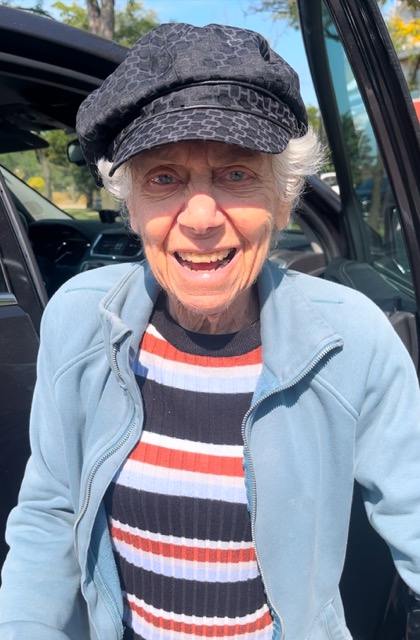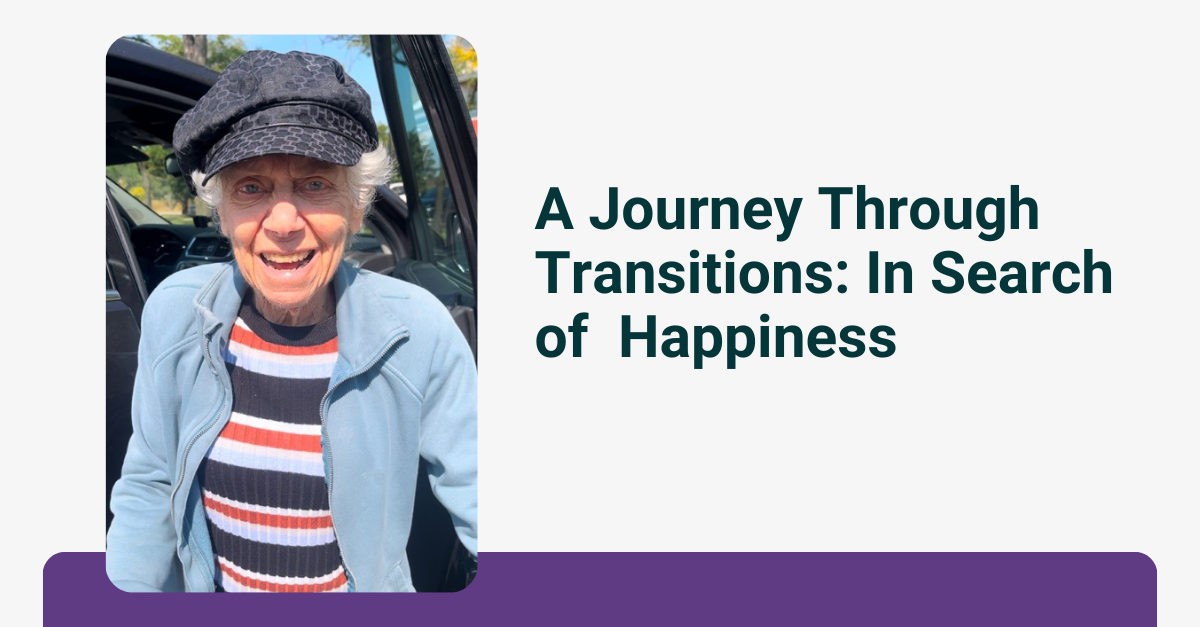Looking back over the past six months, my mom has experienced numerous moves. Knowing how stressful moves can be for someone with a cognitive decline, we carefully weighed the risks, hoping to provide her with the comfort and safety she deserves in her final years. Finding the right path has been difficult.
Our journey began when it became clear that my mom was no longer thriving in the assisted living community she had called home for a decade. She had moved there with my dad, but as her dementia progressed, she was no longer safe. She began wandering in the middle of the night, growing increasingly confused, and struggling to engage with other residents which led to her being ostrasized due to her confusion.
 Our first instinct was to find a way for her to stay there so she would be able to “age in place.” We tried adding additional support by bringing in a private care partner, but she refused every attempt we made. So in the end we had no choice but to come up with a different solution.
Our first instinct was to find a way for her to stay there so she would be able to “age in place.” We tried adding additional support by bringing in a private care partner, but she refused every attempt we made. So in the end we had no choice but to come up with a different solution.
In hopes of improving her quality of life, we decided to move her back to her home in Northbrook—where she truly wanted to be. We hired what we thought was the “perfect care partner” and believed this move would be the answer. However, within weeks, problems arose.
My mom resisted the care partner’s presence, her behavior became more challenging, and when the care partner left unexpectedly, we had no choice but to find a safe place for her to live temporarily while we searched for a long-term solution.
We placed her in a nearby memory care facility, hoping this environment would meet her needs. After just three weeks, however, some of the siblings believed my mom’s distressed behaviors were directly related to the environment she was living in and not the progression of the disease, so they decided to bring her back home with a new care partner and a lot more sibling support.
We were optimistic that this would finally work, but her agitation and cognitive decline continued to worsen, making it clear that staying in her home wasn’t sustainable.
We moved her again—this time to a new community we believed would be the ideal fit. She stayed there for a month, but her unhappiness persisted. Desperate to find a solution, we moved her once more, back to the community she had lived in for 10 years, this time to their memory care neighborhood. We thought the familiarity of the staff and surroundings would ease her transition. Unfortunately, despite our hopes, it is yet to be seen.
As we’ve come to realize, her unhappiness isn’t necessarily about where she lives or who cares for her. It stems from the confusion, frustration, and loss of independence brought on by dementia. In this middle stage, she struggles to understand why she can’t be with her children or live independently, which leaves her emotionally distressed.
The Emotional Toll on Families
For us, her children, the hardest part is accepting this reality. We want nothing more than for our mom to feel happy, safe, and cared for—just as the beautiful person she has always been deserves. Watching her struggle is heartbreaking, and the grief we feel is both ongoing and complex.
Education: Understanding Dementia and Happiness
Dementia profoundly impacts a person’s ability to experience happiness as they once did. Brain changes disrupt memory, thought processes, and emotional regulation. The loss of independence and sense of identity can leave individuals feeling helpless or isolated. Even moments of clarity or joy are often overshadowed by the disease’s relentless challenges.
Ambiguous Grief: Mourning While Caring
What we’re experiencing as a family is often referred to as ambiguous grief—mourning the person our mom once was while grieving the loss of who she is becoming. This type of grief is uniquely challenging because it isn’t a traditional loss. She is physically present but emotionally and cognitively distant, creating a deep sense of confusion and sorrow.
A book I highly recommend to my clients who are experiencing the same sort of heartbreak we are is called “Loving Someone Who Has Dementia” by Pauline Boss. This book is a comprehensive guide that offers practical and emotional support for family members who are caring for someone with dementia. The book addresses the unique challenges of loving and caring for someone who is slowly changing due to dementia, and it provides insights into how caregivers can cope with the emotional strain that comes with this type of caregiving.
Summary of Key Concepts:
Ambiguous Loss: This is a type of loss that is unclear and often unresolved. In the context of dementia, the person you love is still physically present, but their cognitive abilities are deteriorating. They may not recognize you, may not remember important events, or may not behave in ways you once knew them. This ongoing loss can create feelings of confusion, grief, and uncertainty. Unlike a clear-cut death, where mourning follows a more structured process, ambiguous loss creates an emotional and psychological challenge for caregivers who have to reconcile the person’s physical presence with their cognitive absence.
Coping Strategies:
- Maintaining connections: Finding ways to connect emotionally with the person, even as their cognitive abilities decline, can help reduce the sense of loss.
- Seeking outside support: Caregivers need to seek emotional and practical support, whether through counseling, support groups, or other caregivers who understand their struggles.
- Self-care: Caregivers must also take care of their own physical and emotional health. Neglecting self-care can lead to burnout and further emotional distress.
Redefining the Relationship:
Caregivers often need to redefine their relationship with the person with dementia. This may mean letting go of the expectation that the person will “return to normal” and instead focusing on finding new ways to relate to them. This involves adjusting one’s perspective on the individual, acknowledging their changing abilities, and finding meaningful ways to connect in the present.
The Importance of Flexibility and Resilience:
As dementia is unpredictable, caregivers must be flexible and resilient, willing to adjust expectations and caregiving strategies as the disease progresses. This means finding new ways to communicate, manage behaviors, and provide care in a way that respects the person’s dignity.
Hope and Acceptance:
Finding hope despite the challenges, Encourages caregivers to accept that the person they once knew is changing and that they must accept the reality of dementia while still maintaining compassion and love. She notes that finding moments of joy in the caregiving process is possible and can provide emotional relief.
Moving Forward
While our journey to find my mom’s happiness continues, we’re learning to accept that her contentment may not look the way it once did. Instead of striving for what was, we focus on creating moments of comfort and love in the present. For families facing similar challenges, know that you’re not alone, and support is available to guide you through every step.

